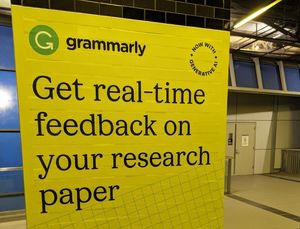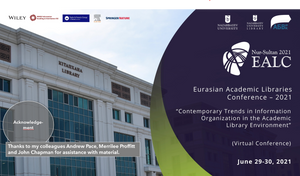One of the consequences of our network world is that more and more activities are ‘informationalized’: they generate data and the management of data is an important part of their operation.
We will increasingly see applications which want to mix information about researchers and publications with information about projects, organizations, and so on.
This prompts some interesting questions about the organizational context of information management on campus, and certainly provides the library with opportunities to reach out to new partners around information management issues. Current interactions probably depend on local personalities and politics, but one might expect new organizational forms to emerge over time as information management needs, repository and data infrastructure requirements, and the need to work across departmental silos become more apparent. A parallel development is the need to develop community standards for data which before was locally managed or not managed at all (CERIF, mentioned below, is an example).
Here are two areas at different stages of development which throw up some of these issues ….
An interesting example in recent years has been the management of information about campus research activity, particularly in countries where there is an emphasis on national assessments tied to funding. One sign of this has been the growth of ‘research analytics‘. A related one is the emergence of a new service category, the CRIS (Current Research Information System), and several companies offer such services. There is a metadata standard – CERIF – associated with this activity, which is managed by the EuroCRIS organization. CERIF covers data about entities of interest in the research process – persons, projects, institutions, and so on.
A related activity is the growing interest in ‘expertise’ or ‘reputation’ systems which provide a managed framework for researcher interests, expertise, experience, and so on. The balance between internal personnel focus and an external focus may vary.
Of course, this prompts a natural question: what is the relationship between an institutional repository and a CRIS? There is an interesting overview from a technical perspective by Les Carr, a principal in the important Eprints research, advocacy and services initatiives at the University of Southampton.
Here is a discussion of repository initiatives at Trinity College Dublin which places repository development in the context of campus-wide research management issues. See slide 13 in particular for a schematic of institutional relationships.
This interaction has been a particular interest of my colleagues working in the Research Information Management strand of our work and John MacColl has an informative report on the implications for libraries of the information management practices encouraged by research assessment regimes (see description and links here).
I only recently came across my second example of evolving information management practices. This one is much less well developed. Martin Hamilton, responsible for Internet Services at the University of Loughborough, pointed me at the PIPAL study, which explores customer and partner relationship management issues and potential systems at the university. Now, of course, customer relationship management – CRM – is a well established business category with major industrial vendors providing on-site and cloud-based software and services. However, it is not so well developed in an academic setting. The PIPAL report is very clearly written and steps through issues nicely (noting that there is “a danger of alienating colleagues working in education through excessive use of business jargon”, for which reason they talk about ‘relationship management’ rather than ‘customer relationship management’). A key paragraph is as follows:
This is the key to understanding Relationship Management – in order to understand and best exploit the relationships an organization has, it is necessary to create and then subsequently effectively curate a “database” of this information. In a traditional organization each unit would maintain its own independent database, with little or no information sharing – to the detriment of all those involved. [PIPaL]
A University will manage relationships with organizations across the private sector, government, the not-for-profit sector, and other academic organizations. A variety of stakeholders – vice chancellor’s office, academics and academic departments, marketing, research office, enterprise office, hospitality, and so on – typically manage data about such relations. The report provides an interesting image of the systems providing data relevent to relationship management at Loughborough.

The report goes on to discuss existing relationships and workflows within the institution. It also has a very interesting chapter on technologies, noting the potential of linked data in providing a ‘low-impact “University API”‘ to allow data to be recombined within and across institutions. Of course, one issue here is the absence of agreed vocabularies for many of the entities of potential interest.
The report is recommended as a gentle introduction to data issues around an emerging service area, and as an exploration of potential future directions. The discussion of linked data and identifiers reminds us of library discussions.
(Note: It occurs to me that the examples above are from institutions outside the US. In each case there is a convergence of local management interests and national organizing or supporting initiatives.)



